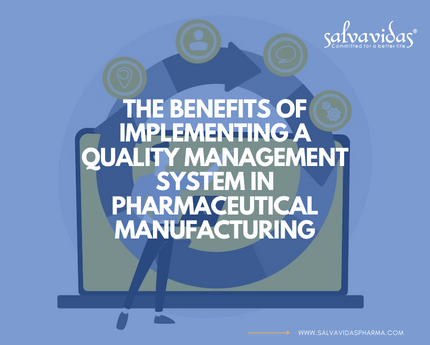
The Benefits of Implementing a Quality Management System in Pharmaceutical Manufacturing
Introduction:
The pharmaceutical industry has a critical responsibility to manufacture high-quality products that are safe for consumption. Implementing a Quality Management System (QMS) can help manufacturers maintain the quality of their products by adhering to regulatory requirements and improving production processes. This article discusses the benefits of implementing a QMS in pharmaceutical manufacturing.
- What is a Quality Management System?
- The Importance of Implementing a QMS in Pharmaceutical Manufacturing
- Benefits of Implementing a QMS in Pharmaceutical Manufacturing
- How to Implement a QMS in Pharmaceutical Manufacturing
- Frequently Asked Questions (FAQs)
- Conclusion
- What is a Quality Management System?
- Definition of QMS
- Components of a QMS
- The Importance of Implementing a QMS in Pharmaceutical Manufacturing
- Compliance with Regulatory Requirements
- Improved Product Quality and Safety
- Increased Efficiency
- Competitive Advantage
- Benefits of Implementing a QMS in Pharmaceutical Manufacturing
- Consistent Product Quality
- Enhanced Customer Satisfaction
- Improved Risk Management
- Increased Employee Engagement
- Cost Savings
- How to Implement a QMS in Pharmaceutical Manufacturing
- Identify Quality Objectives
- Develop Quality Policies and Procedures
- Establish a Quality Manual
- Provide Employee Training
- Perform Internal Audits
- Continually Improve the QMS
- Frequently Asked Questions (FAQs)
- What is the difference between a QMS and a Quality Assurance System?
- Who is responsible for implementing a QMS in pharmaceutical manufacturing?
- What are the consequences of non-compliance with regulatory requirements?
Conclusion:
The implementation of a Quality Management System in pharmaceutical manufacturing is essential to ensure consistent product quality, comply with regulatory requirements, and enhance customer satisfaction. By following the steps to implement a QMS and continually improving it, manufacturers can reap the benefits of improved efficiency, risk management, and cost savings.
Bullet Points:
Benefits of Implementing a QMS in Pharmaceutical Manufacturing:
- Consistent product quality
- Enhanced customer satisfaction
- Improved risk management
- Increased employee engagement
- Cost savings
FAQs:
Q: What is the difference between a QMS and a Quality Assurance System?
A: A QMS is a comprehensive system that encompasses all aspects of a company’s operations, while a Quality Assurance System focuses on ensuring product quality.
Q: Who is responsible for implementing a QMS in pharmaceutical manufacturing?
A: The responsibility for implementing a QMS lies with the company’s management, with the involvement of all employees.
Q: What are the consequences of non-compliance with regulatory requirements?
A: Non-compliance with regulatory requirements can result in fines, product recalls, and damage to a company’s reputation.
Conclusion:
In conclusion, implementing a Quality Management System in pharmaceutical manufacturing is crucial to ensuring consistent product quality, complying with regulatory requirements, and enhancing customer satisfaction. By following the steps to implement a QMS and continually improving it, manufacturers can reap the benefits of improved efficiency, risk management, and cost savings. The benefits of implementing a QMS are significant and cannot be overlooked in today’s competitive market.

0